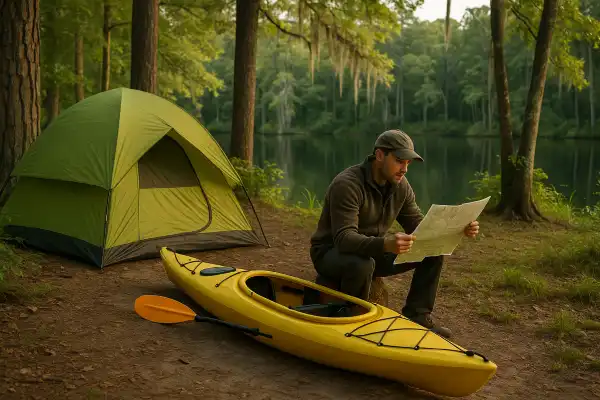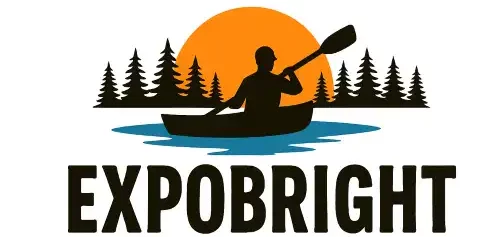Where can you kayak camp in Georgia? stands as one of the most frequently asked questions among paddlers seeking to extend their adventures beyond day trips. Georgia’s diverse waterways create unique opportunities for multi-day excursions that combine the serenity of paddling with the adventure of wilderness camping.
My own introduction to kayak camping began right here in Georgia during a childhood trip to the Okefenokee Swamp, where sleeping on a platform surrounded by cypress trees and the sounds of the wilderness left an indelible mark on my paddling journey. That experience taught me that Georgia offers some of the most distinctive and accessible kayak camping destinations in the Southeast.
Must read for your safety when kayak camping: How to get rid of spider in a kayak?
Where can you kayak camp in Georgia?
Georgia provides numerous locations for kayak camping, from coastal barrier islands to inland river systems and pristine swamplands. The Okefenokee National Wildlife Refuge offers eight overnight platforms and two islands for wilderness camping, while the state’s barrier islands, river systems, and select state parks create additional opportunities for paddle-to camping experiences.

Okefenokee National Wildlife Refuge
The Okefenokee National Wildlife Refuge stands as Georgia’s crown jewel for kayak camping, offering seven platforms and two islands for wilderness camping where paddlers can camp up to 12 miles into the swamp. Each platform includes partial roof coverage, a picnic table or shelf for cooking, and a pit toilet, with some built over open water for amazing sunset and sunrise views.
The camping fee runs $15 per person per night plus a one-time $10 reservation fee, with reservations available up to two months in advance through Recreation.gov. The platforms at Cedar Hammock, Monkey Lake, Coffee Bay, and Bluff Lake serve both day-use and overnight campers, while campfires are only permitted at Canal Run, Floyds Island, and Mixons Hammock.
Georgia’s Barrier Islands
The Georgia coast presents exceptional opportunities for kayak camping on barrier islands accessible only by paddle. Little Tybee Island offers over 40 miles of waterways despite its somewhat deceiving name, with 4 miles of Atlantic beaches home to no one but wildlife. Paddlers can establish beach camps on the southern end after navigating through salt marsh systems.
Cumberland Island, Georgia’s largest and southernmost barrier island designated as a national seashore in 1972, provides camping opportunities nestled under ancient maritime forest canopy just minutes from pristine beaches. Ossabaw Island serves as Georgia’s first Heritage Preserve, offering paddlers access to a unique perspective of intricate estuaries and undisturbed wildlife habitat.
Wassaw Island functions as a national wildlife refuge with mature maritime forests and miles of deserted beach, including the famous Bone Yard grove of live oaks taken by the sea.
River Systems for Multi-Day Camping
The 200-mile Ocmulgee River Water Trail offers several spots to stop for the night with no reservations or fees required, making it ideal for overnight trips with mostly flatwater and some class I rapids. The river features plentiful white sandbars at almost every bend that serve as inviting rest stops and overnight camping opportunities.
The Altamaha River system, recognized by Nature Conservancy as “one of 75 last great places in the world,” provides camping opportunities on white sandbars throughout its 122-mile paddling section. This undammed river supports more than 130 rare and endangered species and offers exceptional wildlife viewing opportunities.
The Toccoa River presents a 13.8-mile paddling section that makes for an excellent weekend paddle and camp trip, while the Little River Water Trail spans 20 miles through Clarks Hill Wildlife Management Area with several campgrounds along the route for easy overnight paddling.
State Park Paddle-to Camping
Georgia state parks offer unique paddle-to camping experiences that combine accessibility with wilderness adventure. Reed Bingham and High Falls state parks feature paddle-to private island campsites with primitive amenities, requiring paddlers to pack everything needed for their stay.
Lake Tugalo at Tallulah Falls provides numerous remote campsites accessible only by paddle, with no cell service and a requirement to paddle out to reach the camping areas. Carter’s Lake offers boat-in camping opportunities with a 2+ mile paddle to peninsula campsites.
Mountain and Piedmont Options
The Etowah River through Dawson Forest presents secluded camping opportunities along the route, including a scenic spot beside Barefoot Falls. This location offers relative seclusion for paddlers seeking a more intimate wilderness experience.
The Toccoa River Canoe Trail meanders for nearly 14 miles through Chattahoochee National Forest wilderness, featuring long stretches of flatwater with mild class I and II rapids, perfect for beginners planning overnight trips.
Coastal Salt Marsh Adventures
The Georgia Coast Saltwater Paddling Trail includes 170 miles of tidal marshes, rivers, and coastline with 35 access points and overnight trip options. These coastal adventures require careful planning around tidal schedules but reward paddlers with unique ecosystems and abundant wildlife.
Professional outfitters like Savannah Canoe and Kayak offer guided multi-day expeditions to these remote locations, providing expertise in navigation, tide planning, and campsite selection for those new to coastal kayak camping.
Conclusion
Last summer, I returned to Georgia’s coast for a three-day expedition to Little Tybee Island, where careful planning transformed what could have been a challenging wilderness experience into an unforgettable adventure. The difference between a successful kayak camping trip and a difficult ordeal often comes down to understanding the specific requirements and opportunities each location presents.
Following a comprehensive guide to Georgia’s kayak camping destinations allows paddlers to select locations matching their skill level, equipment, and adventure goals. Georgia’s waters offer everything from protected swamp platforms to remote barrier islands, ensuring every kayak camper can find their perfect wilderness escape.
Follow Expobright for exclusive kayak and canoe camping tips.
